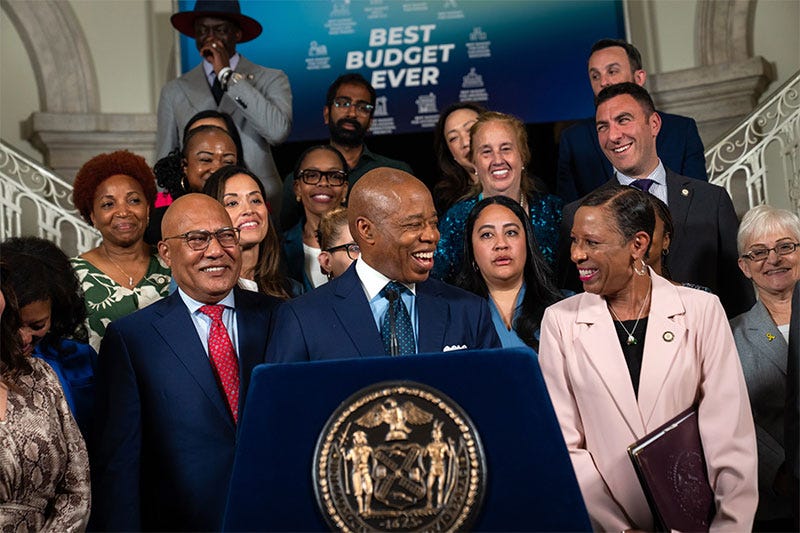First things first: our July happy hour is set for Wednesday, 7/16, location TBA. RSVP now!
If you can believe it, governing didn’t stop during the home stretch of the primaries. New Yorkers’ attention might have been diverted, but work was still getting done in City Hall and Albany.
That’s not to say much happened. Par for the course, state lawmakers are punching out for the year without major progress towards addressing New Yorkers’ challenges—from housing costs to climate change—while the city budget is mostly more of the same.
Tomorrow we’ll get the first run of ranked choice vote tabulations, revealing the winners of unresolved down-ballot races and seeing the scale of Zohran Mamdani’s mayoral victory. But before attention whips back to the electoral, see below for policymaking news you may have missed.
The City: De Facto Mayor Mastro Undoes What Mayor Adams Did
The big news from City Hall last week was an all-Adams handshake deal between Mayor Eric and Speaker Adrienne on a $115+ billion city budget. It includes increases to library hours, afterschool seats, and legal assistance to immigrants, as well as funding for a pilot of free childcare for kids under two.
While the mayor was approving the contours of a budget—and launching his reelection campaign, hoping to become the main vehicle for voter expression of anti-Mamdani sentiment—his top underling, First Deputy Mayor Randy Mastro, was slashing and burning.
You might remember former FDM Maria Torres-Springer as a key driver behind much of the Adams admin’s successes—particularly the City of Yes for Housing Opportunity Rezoning that legalized 80,000 new homes across the city. She resigned in the wake of the mayor’s corruption scandal.
Adams replaced her with Mastro, who in late 2024 had been forced to withdraw as nominee for corporation counsel, the top lawyer for the city. The Council didn’t like the proposed counsel’s record, including his work litigating against the city on congestion pricing and Local Law 97 (which reduces emissions from city buildings).
Now that Mastro is empowered, he’s getting to work—undermining Adams’s previously well-earned reputation on issues like housing and sanitation. Under Mastro, the city has:
Delayed deadlines for emissions reductions under Local Law 97 and stopped fines for failure to comply with composting rules—pending further education of homeowners, but without any new resources dedicated to such education.
Attempted to rip out a lifesaving protected bike lane in Brooklyn after local complaints while pushing through a 15 mph cap for e-bikes—even when they're riding alongside faster (and deadlier) cars.
Pulled the plug on 100% affordable housing for low-income seniors on city-owned land in development for over a decade, promising replacement homes that will take many more years to get underway.
Thankfully, while Mastro undertakes a revanchist campaign, Adams’s earlier investments are still bearing fruit. For example, the Midtown South Mixed-Use Plan, which will add nearly 10,000 critically needed new homes to midtown Manhattan, was approved by the City Planning Commission and now goes to the City Council.
🙋 The public hearing is tomorrow morning: sign up here to testify in favor, submit written support if you can’t testify live, and let us know if you want more information!
We’ll be watching to see whether de-facto Mayor Mastro continues the admin’s NIMBY turn, or whether the actual mayor can reclaim the steering wheel as he drives towards November.
The State: The Climate is Changing, But Climate Policy Isn’t
In Albany, the legislative session ended, meaning that (barring a special session) there won’t be any more lawmaking this year. The legislature got some stuff done, but of the three major abundance bills we highlighted this spring, two-and-a-half of them failed.
The Faith-Based Affordable Housing Act and the Stop Super Speeders bills did not advance, leaving affordable homes unbuilt and deadly drivers on the road. The state legislature must get much more serious about our housing shortage and our streetscape to meet New Yorkers’ needs; of course, 2026 is an election year for state legislators, which could cow them into timidity next session rather than inspire them to bolder action.
On climate, the NY HEAT Act was watered down before a modified version passed, reducing requirements that gas hookups be installed in new homes. That’s not to say climate action was a bright spot: multiple other environmental bills failed as new analysis suggests the state won’t meet its 2030 emissions reductions goals until 2036.
This crawling progress on climate change may be what inspired the biggest recent state news: the announcement by Governor Hochul that New York will build a new nuclear power plant.
Indian Point was shuttered in 2021 even though it provided 25% of the city’s energy, leaving us more reliant on fossil fuel plants. More clean energy is a good thing, so we’ll be excited to see this project get underway as the state legislature figures out how to contribute to addressing climate change.
We’ll be back later this week with electoral updates. In the meantime, mark your calendar for our July 16 happy hour, where we’ll debrief on policy and politics over a well-earned summer cocktail.





